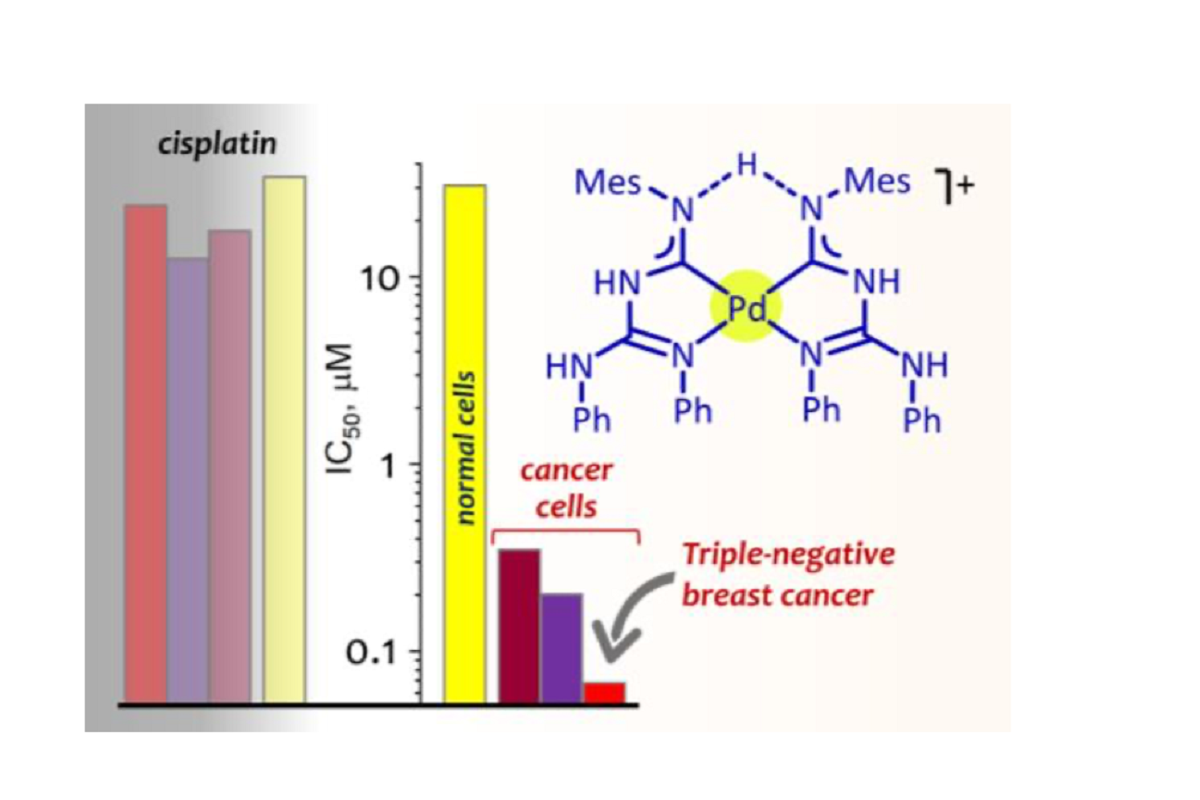Chemists from St Petersburg University synthesise non-toxic compounds promising for breast cancer therapy
Scientists have developed a series of compounds that can interfere with the metabolic processes of cancer cells and trigger the process of their programmed death. The compounds are safe for healthy tissue and can inhibit the activity of malignant tumours. The discovery could become the basis for the development of a new generation of drugs for targeted therapy of cancer. Scientists from St Petersburg University, Togliatti State University, the Blokhin National Medical Cancer Research Centre and Belarusian State University took part in the study.

Cancer is one of the most serious diseases of our time. According to the World Health Organization, cancer is the second leading cause of death worldwide. Present-day cancer chemotherapy drugs, including the well-known platinum drug cisplatin, can slow or stop the growth of cancer cells. However, they also have a strong effect on healthy cells, negatively affecting the patient's overall condition. For this reason, the world's academic community is actively working to develop new, more effective methods of cancer treatment that do not damage healthy tissue.
The research findings are published in Chemistry — A European Journal.
The group of researchers has synthesised compounds with high anti-tumour activity, paving the way for the development of a new drug to treat cancer. Due to its specificity, the drug will only attack cancer cells, bypassing healthy body tissue, and will be safely eliminated from the body without negative side effects.
‘Our solution is based on organic palladium compounds. Palladium compounds have low toxicity, unlike platinum compounds used in chemotherapy, but for a long time such substances were considered unpromising for medical use due to their rapid degradation in the body. Thanks to the clever design of the molecule, we have managed to overcome this limitation: the synthesised compounds are highly stable, the solutions remain unchanged for at least two years, which is unique for the chemistry of palladium compounds,’ said Mikhail Kinzhalov, Associate Professor in the Department of Physical Organic Chemistry at St Petersburg University.
The method used by the chemists is unique in that it gives an opportunity to assemble an organic molecule directly in the coordination sphere of the metal – this has made it possible to obtain substances that were previously impossible to synthesise. The method developed by the scientists is easily scalable and allows new molecules to be obtained from three available and inexpensive reagents in a single reactor. The method follows the principles of 'green chemistry' because all the atoms of the reagents are incorporated into the product.
When we obtained and tested these substances, we found a compound (a hit) that, firstly, works in a model of one of the most difficult clinical cases of breast cancer – triple-negative breast cancer (TNBC). Secondly, it was found to be three times less toxic to human embryonic kidney cells and about 350 times less toxic to fibroblasts. This means that our hit is not just an agent that kills everything in its path. It has selectivity.
Alexander Bunev, Director of the Medicinal Chemistry Centre at Togliatti State University
Although the new compounds can target different types of cancer cells, they are most effective in treating triple-negative breast cancer. This type of cancer is very aggressive, resistant to hormone therapy and difficult to treat: oncologists have limited treatment options and can only use chemotherapy as the only treatment for patients with triple-negative breast cancer.
The lead compound is active at low nanomolar concentrations and is at least 300 times more active than cisplatin in in vitro studies. At the same time, it retains high anti-tumour activity even under hypoxic conditions, due to its ability to overcome multidrug resistance mechanisms that arise in triple-negative breast cancer tumours and reduce the efficacy of existing drugs. On the other hand, it is worth noting that the compounds showed low activity against normal cells, indicating their high selectivity against cancer cells. Selectivity indices of up to 335 are significantly higher than those of cisplatin (2-5). Several drugs with high selectivity for tumour cells have been reported, but none has achieved a selectivity index of more than 100 in in vitro studies.
The study was carried out by a group of researchers from the Russian Federation and the Republic of Belarus. Recently, the leadership of both countries adopted the Strategy for Scientific and Technological Development of the Union State for the period until 2035. This research is the second within the framework of this area of study.
The lead compound proved less toxic to mice than cisplatin and surpassed it in efficacy against breast cancer. Research in mice with implanted human tumours showed that use of the new drug slowed tumour growth compared to the control group. During 35 days of treatment, there was a 75% reduction in growth compared to untreated mice.
The research team will continue with mammalian experiments to identify specific therapeutic targets and improve targeted drugs.

